 Jon Bruning
Jon Bruning
Last summer, we published articles about three of the five GOP primary candidates running for the U.S. Senate seat currently held by Ben Nelson. Those three articles were informational in nature, not analytical. (We hope to update these with some analysis in short order, time permitting):
- Senator Deb Fischer Hat in Widening GOP Ring for Nebraska’s US Senate Seat
- Nebraska US Senate GOP Candidate Spencer Zimmerman
- More on GOP Senate Candidates: Don Stenberg
This article focuses on current Attorney General Jon Bruning, widely considered the front runner in the race.
Why we have titled this analysis unorthodox…
Since Bruning is perhaps the most well-known of all five candidates, there is already a wealth of basic information available and only days remain until the May 15 Primary, we are going to handle this article differently from earlier articles about candidates for U.S. Senate. More importantly, though, we believe we have provided here (and in additional article we will publish later today) some information about Jon Bruning that has received little or no mention anywhere else.
Biographical information:
- Ballotpedia: This source seems the most comprehensive online
Other sources, to which it can be compared and contrasted:
- Wikipedia
- Official biography on Bruning’s campaign website
Bruning announced his intention to form an exploratory committee regarding a U.S. Senate run just after Nebraska’s Governor Dave Heineman announced that he would not be running himself. We published the following article as a result:
Jon Bruning Announces Bid for Senate – We Should Listen to Our Mommas
The linked article makes it clear that the ink was not dry on the reports of Bruning’s November 2010 re-election to the Office of the Attorney General before he announced his intention to attempt to unseat Senator Ben Nelson in November 20121. Was it disingenuous for Bruning to run for re-election as Attorney General if he did not intend to fulfill the term of office? By doing so, Bruning arguably put his interest in gaining a Senate seat ahead of Nebraskans’ interest in having a full time Attorney General for these two years he’s spent campaigning. We’ll leave it up to the voters to decide for themselves whether Bruning’s actions reflect upon his character generally and upon our ability to trust his word regarding his intentions specifically.
Bruning’s competition in the primary has placed his record in question, relying largely upon public statements or actions by Bruning over the years. Perhaps the most concise summary of those concerns can be found HERE with links to supporting documentation2. GiN recommends reading the entire article AND following the links because reasonable minds may differ as to how heavily each of the different points weighs against Bruning. That determination will depend upon what you consider a candidate’s “record” to be, whether it consists solely of positions taken in the capacity of a candidate or political officeholder or extends beyond that sphere and how recently or remotely in time Bruning held those positions. For example, source documentation for seven of the seventeen items on the list of concerns linked above consists of articles Bruning wrote for the Daily Nebraskan when he was a 24 year old, second year law student at the University of Nebraska College of Law, i.e., in 1992-1993. They include:
- Supporting universal healthcare
- Supporting higher gas taxes and Social Security taxes (although, in the same article, Bruning calls for curtailing the growth of entitlements)
- Supporting abortion
- Backing gun control
- Backing gay rights
- Opposing Reagan economic policies and personally attacking him
- Praising affirmative action
Five of these seven positions were taken from a single article in which Bruning characterized himself as a political liberal and called out conservatives to “come out of the closet” and debate him on these and other issues of the day. Yet, by the time Bruning first ran for public office just three years later, he was a Republican.
Bruning is now 43 years of age, characterizes himself as a conservative Republican, and, in this and other campaigns, has professed support for positions contrary to those he called his own when he was a columnist for the Daily Nebraskan. Is his repudiation of his earlier beliefs credible? That is a question each and every voter must answer before election day.
A fact which may resonate most strongly with Lincolnites: Bruning supported the Lincoln Arena Project, a public works boondoggle that will most likely end up costing the city money rather than encouraging economic development. In addition, that project’s financing involved stimulus funds, so this is a second example of Bruning approving of the expenditure of stimulus funds even though he claims that he did not support the stimulus bill3. Bruning participated in a press conference and a rally in favor of the Arena just before the public voted on the issue. In fact, Bruning even appeared in a television commercial with Lincoln’s liberal Democrat Mayor Beutler and equally liberal Democrat former Senator/now Lincoln City Councilwoman Dianna Schimek, among others, urging Lincolnites to vote “Yes” on the project. Here’s that commercial in case you missed it:
An additional fact that may resonate strongly with Lincolnites or anyone opposed to climate change / “goin’ green” policies: Bruning contributed $50,000 in discretionary funds from the Attorney General’s office to Chris Beutler’s “Cleaner Greener Lincoln” project. Lincolnites and Omahans have become increasingly aware of their Mayors’ mutual embrace of the United Nation’s very left-wing public policy agenda known as Agenda 21, and that each city spent public funds to become members of the U.N.’s ICLEI organization. “Cleaner Greener Lincoln” is an outgrowth of that agenda. After we reported the Attorney General’s contribution to Beutler’s project, we were informed by multiple sources that Bruning was questioned about the donation at a February 2011 meeting. Although he admitted that he did have discretion regarding how the funds he used were allocated, he reportedly seemed flustered and was unable to justify his decision to make the contribution when he was pressed to explain it.4.
A reasonable question: Why is Jon Bruning considered the front-runner in the race? Opinions may differ on this subject, but considering the timing of Governor Heineman’s and Bruning’s announcements immediately following Election Day 2010, it’s reasonable to conclude those announcements were coordinated. Further, considering that Dave Heineman’s position as Governor makes him the de facto leader of Nebraska’s Republican Party, such coordination has additional implications.
To understand some of our analysis that follows here, and generally regarding the election, we recommend a read (or re-read if you’re a regular visitor here) of our article:
“Nebraska’s Ruling Class and the Perils of (Assisted) Political Suicide”
In the section entitled “Elections and Candidates” in describing what our research, experience, and observation caused us to conclude, we asserted:
“Candidates are supported by turn, not by merit.”
In analyzing Jon Bruning as candidate for the GOP nomination for the U.S. Senate race, it is not unreasonable to conclude that Mr. Bruning’s front-runner status is heavily based on two factors:
- It was his turn
- He has historically had the ability to raise large amounts of money
The Washington Post in a series of articles about “rising political stars”, published, “The Rising: Jon Bruning’s Time”, in July, 2011. “Jon Bruning has never hidden his ambition, “ it begins and , soon after, moves to a Bruning quote from a 2010 WP interview, “I’m like a horse in the barn, I’ve been ready to run for a long time.”
Readers will recall that Bruning competed for the GOP nomination for U.S. Senate four years ago, but, like all other candidates, he withdrew following Mike Johanns’ entrance into the race. It could be said that it was Mike Johanns’ turn in 2008. Discourse among and between commenters on the popular Leavenworth Street site regarding an article entitled, “Will Bruning drop out?” provides insight to that type of thinking at the time among one subset of Nebraskans – a fairly accurate description of that subset would be that it is mostly the tech-savvy political junkie crowd, especially over four years ago.
Jon Bruning and Campaign Finance:
Note that an in-depth analysis of Jon Bruning’s history of fundraising is too important and lengthy a subject to properly handle in this article. We have already prepared and will be publishing, later today, a separate article on that subject.
Basic information…
Follow the Money: Bruning 2000 – 2012 overview page but EXCLUDES U.S. Senate race
Nebraska Accountability and Disclosure Commission (NADC): Bruning for Attorney General full list of filings
Federal Election Commission (FEC): Bruning 2011 – 2012 overview
FEC: Bruning for Senate, Inc.
Open Secrets – lists data for ALL Nebraska candidates in the U.S. Senate race
Here is an image from the Open Secrets listing, with Jon Bruning’s information:
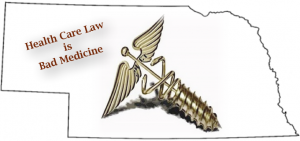
Click to view the list of our many articles about the issue of health care
And one final, but very important subject, of interest to many Nebraskans: The health care law. The health care law and truly stopping its implementation has long been a top priority for us here at GiN and so we have naturally spent a great deal of time researching and writing about it.
Jon Bruning has, very clearly, made it a centerpiece of his campaign. The majority of television and radio ads mention Bruning’s opposition to “ObamaCare” and his involvement in the lawsuit filed by 26 states’ Attorneys General challenging the legislation as unconstitutional.
The campaign’s email communications and direct mailings, too, focus most of the attention on the same subject. Shelli began receiving emails from the Bruning camp in 2011. Here is a snapshot of just part of the email folder where those messages are archived:
Note: One of these messages is not from the Bruning Campaign, but it was archived in the same folder because it is about Bruning
Notice the number of emails with a subject line that mentions the health care law. Here is an example email from the list, above, the one with the subject line “Breaking: Court decision on Obamacare”, dated August 12, 2011 (note that the image features a few notations, some of which explain some logistical / technical aspects of the message, others highlight certain information included):
This particular email provides the ability to discuss the subject of the health care “reform” legislation passed in March 2010, stopping its implementation, and Jon Bruning’s involvement in the Attorneys General lawsuit.
Voters must decide whether claims made by Bruning are accurate and, even if so, whether or not his use of the issue, including its basis for campaign fundraising, is appropriate. The TV ad that perhaps best illustrates Bruning’s campaign strategy regarding “ObamaCare” is one that ran during his 2010 campaign for re-election as Attorney General:
While the ad does include the eyebrow-raising question of what Mr. Bruning might have meant by the Affordable Care Act being “too much, too fast”, much of the ad is otherwise the standard articulation he’s presented since 2010.
One of Mr. Bruning’s most frequent claims, that he has “led the fight against ‘ObamaCare,’” is borne out by the following:
- As Attorney General of Nebraska, Mr. Bruning did join in filing the multi-state lawsuit, immediately upon the passage of the law, and it is a fact that not all Attorneys General did so
- Bruning is one of the six Attorneys General who make up the committee which reportedly has managed the day to day aspects of the lawsuit
- Jon Bruning’s name (and staff) is listed on briefs filed with the U.S. Supreme Court in the case as one of the Attorneys General offices involved in preparing those filings
- Bruning was President of the National Association of Attorneys General 2009-2010 and, consequently, may very well have exerted a significant influence on the filing of the suit and in persuading some number of the states to join in as plaintiffs in the case
Discerning voters might ask, however:
- How effective and thorough has that leadership been?
We have already asserted, more than once (see footnotes5 for much more detail), there are reasons to be concerned about the management of the Attorneys General lawsuit – specifically in regards to the lack of coordination among / between the states who are parties to it. In fact, this lack of coordination, we assert, has long undermined the strength of the case:
- States who were parties to the lawsuit applied for and accepted various federal government grants to pursue implementation of the law following their having joined the lawsuit, which directly contradicted their positions in the case
- Only a few states who were parties to the lawsuit responded appropriately to a federal district judge’s January 31, 2011 ruling in their favor and, as a result, within less than three weeks, that same judge granted a stay requested by the federal government, citing the lack of coherence among the States as one of the reasons6
Another question pertaining to the subject of health care “reform”, the “repeal of ‘ObamaCare’” and Jon Bruning’s actions and statements regarding all:
Notice in the example campaign email provided, the highlighted statement…
“We can’t afford to go through this battle again…”
That statement was written in August 2011 and Ben Nelson had not yet announced his retirement, so presumably “battles” caused by Ben Nelson, such as health care, were the intended subject.
However, considering the overall subject of the email, that language actually raises three troubling points considering Bruning’s particular and long-running position on “ObamaCare”:
- Regardless of what the U.S. Supreme Court ruling includes, specifically, Americans can count on an enormous battle following the November elections – whoever is elected to the Senate seat, whether we think we can afford it or not7. At least that is true, regardless of the ruling, IF Republicans hold true to over two years of promises. If elected to the U.S. Senate, would Jon Bruning lead the charge to repeal the law even if the Supreme Court rules to uphold it?
- What would Jon Bruning propose to do if some parts of the health care law were returned to the U.S. Congress by the Court (one very distinct possibility)? He has not articulated any positions in this regard and no one is asking the question.
- IF the Court rules to overturn the entire law OR the law would be successfully repealed by Congress with the cooperation of the next President, with JUST what would Mr. Bruning propose to replace it? Inquiring minds want to know.
Additional links of potential interest:
For a list of our prior articles mentioning Jon Bruning (multiple pages) CLICK HERE
These links pertain mostly to Jon Bruning’s run for U.S. Senate in 2007
- A Blogspot site put up by an anonymous source which is favorable and supportive of Jon Bruning, dating back to 2007: Bruning4Senate
- A Washington Post article: “Johanns vs Bruning”
- Lincoln Journal Star article: Big names among Brunings’ contributors
- Bruning officially declared his candidacy with the Federal Election Commission on January 1, 2011. ↩
- We note for the record that the article we recommended as the most concise summary of concerns about Jon Bruning as the GOP nominee for the U.S. Senate race was published on the Red State website, which is administered by Erick Erickson. We only linked to it because it has thorough citations supporting it. In the spirit of full disclosure, we are well aware that Mr. Erickson endorsed Jon Bruning in 2007 formerly and that he has endorsed Don Stenberg this round. ↩
- Stimulus funds were used in Arena project financing through the Building America Bonds provision in the Stimulus bill, which was officially entitled the American Recovery and Reinvestment Act of 2009. See this article for more details ↩
- A GiN member sent additional information about the allocation of funds and provided a link to the official Attorney General website page where, as of January 2011, information regarding how lawsuit funds are awarded had been published. That information is no longer available on the website, but the GiN member who provided it did copy and paste from it and included it in the email she sent to us, “The environment is a treasured asset to the State of Nebraska. Nebraskans are proud of the blue sky visible from all corners of the state, scenic rivers that meander through the land, prairies that settlers flocked to so long ago, and cities that respect their surroundings. For these reasons, the Attorney General’s SEP Program looks to fund projects, activities and organizations that seek to invest in the environment. Please be advised that grants from the SEP Program are contingent on the availability of the environmental settlement funds.” The member reported that the funds came from a lawsuit settlement, although the text she provided from the AG site did not report that nor have we independently researched that specific point. ↩
- “10 Untold Truths About Health Care Law State Officials Hope You Miss“, opens with the key points of concern about the overall coordination between / among the states who are parties to the AGs lawsuit. “Alaska Governor: No Health Care Law in AK – What About Nebraska???” gives more specific and detailed information about the ruling in January 2011 mentioned in the text of the article. Note that while the article to which we’ve linked doesn’t mention Jon Bruning specifically, it must be pointed out Attorneys General serve as the lawyer for their states, and naturally, the key individuals whom they advise are the Governors. A few Attorneys General, earlier in time and unrelated to the January 2011 ruling, and others, immediately following it, made clear public statements regarding the return of grant funds and/or the cessation of further implementation activities. Mr. Bruning made no such statements, either as the Attorney General of Nebraska nor as a leader in the lawsuit. Based on the public record and action / lack thereof, it is impossible to avoid the conclusion that Mr. Bruning failed in some regard, both in his representation of Nebraska’s interests and in his leadership role in the AG lawsuit. Finally, for all the talk about the constitution and how “ObamaCare” violates it, we must still wonder: How were the provisions in the Stimulus bill requiring that every American have an electronic medical record by 2014 not only a violation of the fundamental doctor-patient relationship dating back to Ancient Greece and Hippocrates, but also of the Constitution, and therefore, why didn’t Jon Bruning sound that alarm and lead the charge against that? ↩
- Judge Vinson was very aware of the disunity among the plaintiff states so far as their intentions regarding whether or not to continue to implement the health care law during the pendency of an appeal of his decision to the U.S. Supreme Court. In weighing whether or not the states would be harmed if he stayed the effect of his order, Judge Vinson commented formerly/http://healthreformgps.org/wp-content/uploads/Vinson+stay+order.pdf that the severity of any injury to the states caused by the stay was “undercut by the fact that at least eight of the plaintiff states . . . have represented that they will continue to implement and fully comply with the Act’s requirements — in an abundance of caution while this case is on appeal — irrespective of my ruling.” In light of subsequent activities here, it is abundantly apparent that Nebraska was one of those states. ↩
- Considering that there was an unprecedented six hours of oral arguments in the health care case and the legislation at issue was 3000+ pages, the variability in outcomes is broad, ranging from Special Sessions of state legislatures racing to enact implementation legislation to meet January 2013 deadlines to a full-blown “do over” fight regarding “health care reform”, fights in Congress over a partially over-turned law, and a number of scenarios in between. ↩
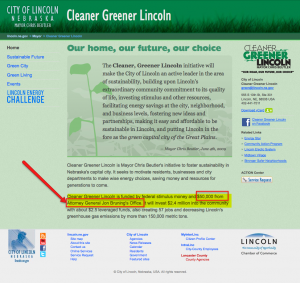
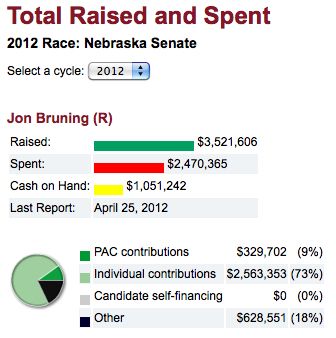
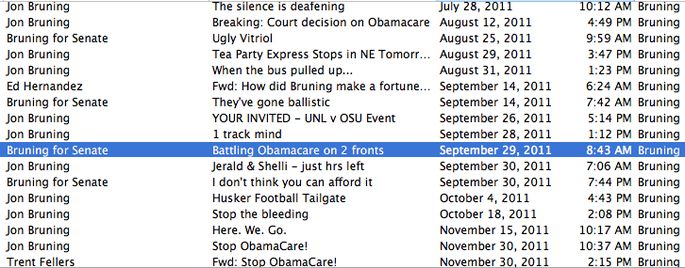
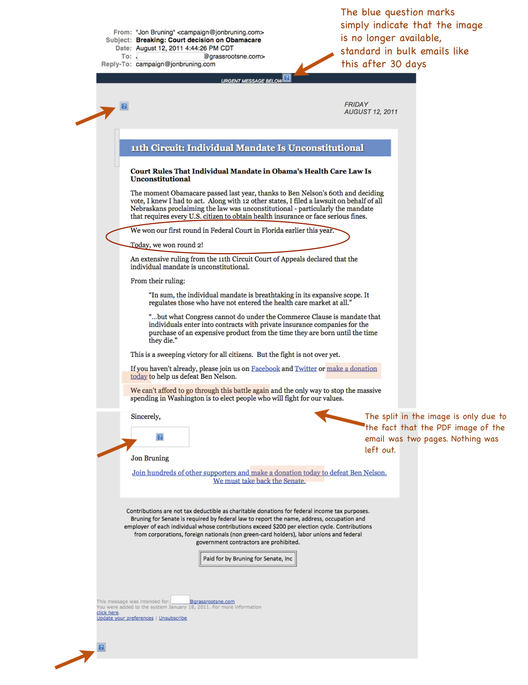
You must be logged in to post a comment.